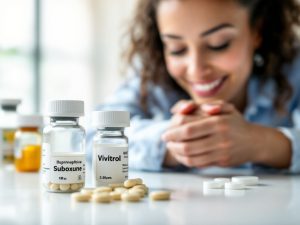Recognize the need for help
When you realize a loved one or even you yourself require cocaine addiction treatment, it can feel overwhelming. It is natural to have many questions about the process, including the types of therapies offered, the likely duration, and where to find evidence-based methods that genuinely work. Cocaine addiction is a complex problem involving physical, emotional, and social factors. Seeking help is a courageous step toward lasting recovery, and that help can be found in a structured, supportive environment.
Cocaine use remains disturbingly common, with some estimates indicating that over 4.8 million people in the United States aged 12 and older used the substance in 2020 (Cleveland Clinic). Understanding the harmful effects of cocaine, and taking swift, proactive measures can significantly reduce the risk of long-term consequences, such as cardiovascular damage, cognitive impairment, or severe withdrawal symptoms if you attempt to stop using abruptly. Additionally, research suggests that about 15% of individuals who have used cocaine become addicted within 10 years (Cleveland Clinic). These statistics show how critical it is to recognize symptoms of cocaine dependence and access care as soon as possible.
Being aware of warning signs such as unusual mood swings, extreme cravings, loss of appetite, and social withdrawal can help you decide when it is time to seek professional support. Early intervention is always beneficial, but it is never too late to reach out for help. Regardless of where you are on your journey to recovery, learning more about treatment options, especially outpatient programs that blend flexibility with robust, evidence-based care, is an excellent way forward.
Explore cocaine addiction facts
Cocaine is an addictive stimulant that can create a sense of euphoria and energy, leading users to seek repeated doses to maintain that feeling. Over time, this cycle makes it difficult to function without the drug, causing physical and psychological dependence. While each person’s circumstances are unique, certain factors—such as genetic predisposition, co-occurring mental health conditions, and social pressures—can amplify the risk of cocaine addiction.
Common signs and symptoms
- Intense cravings or urge to use cocaine
- Irritability, nervousness, and restlessness
- Disrupted sleep patterns
- Elevated heart rate or blood pressure
- Nasal damage (when snorting), respiratory problems (when smoking)
- Preoccupation with obtaining or using cocaine
- Neglect of personal responsibilities
Beyond these physical and behavioral signs, cocaine addiction can also result in social isolation and strained family relationships. If you see these indicators in yourself or someone close to you, it is important to know that outpatient services focusing on a comprehensive care model can address both substance use and co-occurring mental health concerns.
Why immediate action matters
Delaying treatment for cocaine addiction poses serious health risks. Long-term Cocaine use can cause progressive damage to the brain, heart, and lungs, increasing the likelihood of sudden medical emergencies. In 2021 alone, there were over 24,000 overdose-related deaths involving cocaine in the United States (American Addiction Centers). Furthermore, studies suggest that attempting to quit alone, without professional support, carries a relapse rate as high as 90%. This underscores the importance of professional help, which significantly boosts long-term success rates.
By seeking professional treatment promptly, you reduce the risk of serious harm while laying the foundation for lasting recovery. In many cases, professional support includes cognitive behavioral therapy (CBT), peer support groups, and ongoing professional monitoring, all of which have shown to be highly effective in cocaine addiction treatment when combined in a tailored, personalized program.
Examine evidence-based therapies
Addiction treatment for cocaine has undergone extensive research over the years, leading to the development of well-tested methods that not only address the symptoms of addiction but also the underlying causes. These methods help reframe negative thought patterns, improve emotional regulation, and teach practical coping strategies to avoid relapse.
Cognitive behavioral therapy
Cognitive behavioral therapy is often considered the cornerstone of effective cocaine addiction treatment. According to multiple studies, CBT has demonstrated the ability to help individuals recognize triggers, understand detrimental thinking patterns, and develop healthier coping mechanisms. In one study, a condensed form of CBT was found more effective than treatment as usual in promoting relapse prevention among individuals experiencing cocaine addiction (Beck Institute). CBT can be adapted to fit various schedules and care settings, making it remarkably compatible with outpatient addiction treatment programs.
If you are interested in exploring more about how CBT can support your path to recovery, you could consider a specialized track like cbt for addiction. Personalized therapies of this nature make long-term recovery more attainable, especially when combined with additional support options such as group, family, or expressive therapy.
Contingency management and other behavioral methods
In addition to CBT, other behavioral approaches like contingency management (CM) also show promise. CM offers tangible incentives to reinforce positive behavior, such as a milestone of consecutive drug-free days. Research highlights how viable this method is in helping you gain early momentum, particularly in outpatient settings (NCBI). By pairing the structure of a recovery program with a results-driven reinforcement system, many find an added layer of motivation to remain drug-free.
Peer support groups
Solidarity and connection with others facing similar challenges can help you progress in recovery. Peer support programs have been shown to improve outcomes in several critical areas, such as reducing substance use and bolstering treatment engagement (National Center for Biotechnology Information). These groups, whether they operate as stand-alone sessions or as a complementary component to professional care, emphasize mutual understanding. The social support and sense of camaraderie you gain can be essential for relapse prevention. In many outpatient programs, peer support groups are integrated into a wider network of treatments, creating a sense of community and accountability.
Prioritize outpatient support
When you are in search of effective cocaine addiction treatment, the outpatient format can serve as a critical piece of the puzzle. Outpatient programs provide a middle ground between intensive inpatient treatment and the independence of daily-life routines. They allow you to continue fulfilling personal or professional obligations while still receiving structured, evidence-based care.
Benefits of outpatient treatment
- Flexibility: You can schedule sessions around work, family, or school.
- Continuity: It allows you to practice new coping strategies in real-life situations, returning to therapy sessions for support and refining skills.
- Lower cost: Outpatient treatment often comes at a reduced financial burden compared to inpatient programs, without sacrificing the quality of care.
- Gradual transition: For those who initially require inpatient care, stepping down to an outpatient program can ease the move back into everyday life.
An outpatient setup can include anything from partial hospitalization programs (PHPs) offering multiple sessions a week, to more flexible, low-intensity weekly counseling visits. Often, these programs integrate complementary approaches, such as group therapy addiction sessions, one-on-one counseling, and specialized classes. With a combination of therapies in a carefully curated environment, you can tackle negative thought patterns and build new, healthier behaviors.
Who benefits most from outpatient services
The outpatient setting frequently helps individuals who:
- Have a supportive living situation free of major triggers
- Do not require 24/7 medical supervision
- Have moderate to stable mental health conditions
- Are completing an inpatient program
Outpatient treatment can also be beneficial for those who have experienced a recent relapse and need additional structure. Many individuals return to outpatient programs to reinforce their coping strategies or to maintain progress made in more intensive settings.
Discover Epic Health Partners’ approach
Choosing the right treatment center requires careful consideration of the organization’s approach and expertise. Epic Health Partners stands out for its commitment to industry‑leading, evidence-based, holistic behavioral and addiction treatment. Through outpatient programs, our professionals strive to address not only the symptoms of substance use but also any co-occurring mental health conditions. This comprehensive outlook helps you build a strong foundation for long-term sobriety.
Tailored treatment programs
At Epic Health Partners, you can expect individualized plans, recognizing the unique challenges each person faces with cocaine addiction. We believe in offering every client the support necessary for lasting recovery, and we do so by integrating multiple treatment components:
- Cognitive behavioral therapy sessions that address thought processes behind drug use
- Peer support gatherings that foster a sense of community
- Skills-building workshops that teach strategies for managing cravings, stress, and triggers
Treatment is carefully adapted to different circumstances and personal objectives. If you are a working professional balancing a career and recovery, or a caretaker juggling home life, we ensure flexible scheduling. Meanwhile, if you thrive in a group setting for accountability, group therapy options are available to build camaraderie among peers who understand your situation.
Supporting co-occurring conditions
Mental health concerns can exacerbate substance use issues, making comprehensive care even more essential. Addiction is often intertwined with anxiety, depression, or trauma responses, which require simultaneous treatment for the best outcomes. Our programs may include trauma informed addiction therapy for those whose cocaine use stems, in part, from unresolved trauma. By addressing root causes alongside substance use behaviors, you have a higher chance of sustaining positive results.
Additionally, psychiatric assessment and ongoing medication management are available to help you stabilize mood or manage stress levels. If you need specialized care for other addictions—such as heroin addiction treatment or benzodiazepine addiction treatment—Epic Health Partners can guide you. Our team works collaboratively, keeping you at the center of every clinical decision.
Holistic and evidence-based methods
Epic Health Partners’ commitment to providing comprehensive care extends beyond standard therapies. By offering add-on services such as nutritional support, you can improve overall well-being alongside sobriety. Proper nutrition and a balanced lifestyle help repair physical and mental health, laying the groundwork for a stronger recovery journey.
We incorporate the latest research and best practices, closely following developments in medication-assisted therapy and psychosocial interventions. Although no specific medication currently exists for cocaine detoxification, some medications can help reduce withdrawal symptoms under the guidance of a licensed medical team. Our approach focuses heavily on therapies that have consistently proven effective, such as cognitive behavioral approaches, group therapy, and structured plans that encourage continual engagement.
Plan a pathway to recovery
Constructing a solid plan for cocaine addiction treatment involves multiple steps. Being proactive, assembling the right medical and counseling support, and reinforcing your learning at home can smooth the path forward. Recovery requires ongoing effort, but with compassion, empathy, and expert help, you can achieve it.
Start with a clinical intake assessment
By beginning the process with a clinical intake assessment, you and our care team can work together to identify your strengths, challenges, and goals in addressing cocaine addiction. This assessment can cover:
- Evaluating physical health status
- Screening for co-occurring disorders
- Measuring the severity of substance misuse
- Exploring family and social support structures
These details help us personalize your treatment plan. It also ensures we align the course of therapy with your day-to-day obligations, removing barriers that might otherwise hinder progress.
Develop a structured recovery program
If your intake evaluation indicates you could benefit from intensive outpatient treatment, we may recommend a custom structured recovery program. This program usually includes multiple therapy sessions each week, opportunities to practice learned strategies, and accountability check-ins to gauge your progress. A structured approach gives you momentum in the early stages of recovery, helping you maintain focus and motivation.
You may also have access to telehealth addiction counseling or virtual therapy addiction services, which can be assets if travel is challenging or if you require added flexibility. The main goal is to deliver consistent, high-quality support, wherever you are.
Build a supportive environment
Support plays a vital role long after your period of active treatment. Whether you develop a reliable peer network through group counseling or engage in one-on-one therapy sessions, the environment that fosters growth is key. Beyond relationships formed in a clinical setting, you may benefit from family involvement. Programs like family therapy addiction can heal strained relationships, open the door to honest communication, and encourage loved ones to become a positive force in your recovery journey.
Furthermore, small lifestyle adjustments can go a long way. Strategies like journaling cravings, practicing mindfulness or meditation, and dedicating time to recreation promote lasting change. If you struggle with feelings of isolation, ongoing group sessions, peer mentors, or recovery coaching may help. With a clear roadmap and strong support, you can manage cravings, reduce your risk of relapse, and sustain a healthy day-to-day life.
Monitor progress and adapt
Recovery is not a straight line. You might encounter new stressors that trigger thoughts of using cocaine or face changes in personal circumstances that challenge your progress. Regularly scheduled check-ins allow you and your treatment team to monitor your success, celebrate milestones, and address any difficulties early on.
As you move through different phases of treatment, therapies can be adapted to your evolving needs. For instance, you might transition from intensive outpatient sessions to a lower-intensity program, or explore new classes like life skills training addiction. If mental health concerns emerge or intensify, additional counseling or medication management can be added to your treatment plan.
Ultimately, effective cocaine addiction treatment involves a personalized continuum of care. By uniting evidence-based therapies, emotional support, and professional monitoring, Epic Health Partners aims to provide the framework you need to reclaim your life.
Frequently asked questions
Below are five common questions about cocaine addiction and the treatment process. If you have additional questions, our team is here to help guide you through the journey toward lasting recovery.
How long does outpatient cocaine addiction treatment typically last?
The duration of outpatient treatment varies based on your individual progress and needs. Some programs span a few weeks, while others continue several months or longer. Your care provider will regularly assess your situation to ensure that treatment is paced appropriately.Can I maintain my job or family responsibilities during outpatient care?
Yes. Outpatient programs are designed to accommodate daily schedules, so you can continue fulfilling job and family obligations. Many sessions are scheduled in the afternoons, evenings, or weekends, depending on what works best for you.What if I have a co-occurring mental health disorder?
Treating both your addiction and any mental health issues simultaneously leads to better outcomes. Comprehensive programs that offer psychiatric evaluations, counseling, and specialized therapies are crucial in addressing co-occurring conditions. Epic Health Partners provides this integrated approach to ensure you get the support necessary for lasting recovery.How does CBT differ from other forms of therapy?
CBT focuses on identifying and changing harmful thought patterns and behaviors that contribute to substance use. This short-term, goal-oriented therapy is supported by substantial research indicating its success in promoting long-term sobriety. Unlike strictly reflective talk therapy, CBT teaches you concrete strategies to handle cravings and stress.Is relapse a failure?
Relapse is not a sign of personal failure, but rather an indication that your treatment plan might need adjustments. Instead of viewing relapse as a catastrophe, focus on using it as a learning experience to refine strategies, bolster support networks, and continue moving forward in your recovery journey.
Cocaine addiction can be challenging to overcome on your own, but professional help, paired with a committed support system, makes all the difference. At Epic Health Partners, you have access to a wide range of resources, from individual and group therapy to holistic and trauma-informed treatments, all designed to meet you where you are. With dedicated professionals by your side, you can confront the unique challenges of addiction and stride toward a healthier, more fulfilling life.







